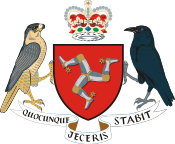Politics of the Isle of Man
This article has multiple issues. Please help improve it or discuss these issues on the talk page. (Learn how and when to remove these template messages)
|
 |
|---|
The government of the
The Isle of Man is not part of the
The
Executive branch
The
When acting as Lord of Mann, the King acts on the advice of the Secretary of State for Justice and Lord Chancellor of the United Kingdom having prime responsibility as Privy Counsellor for Manx affairs.[3]
The executive branch under the Chief Minister is referred to as "the Government" or the "Civil Service", and consists of the Council of Ministers, nine Departments, ten Statutory Boards and three Offices. Each Department is run by a Minister who reports directly to the Council of Ministers. The Civil Service has more than 2000 employees and the total number of public sector employees including the Civil Service, teachers, nurses, police, etc. is about 9000 people.[inconsistent with statistics in Isle of Man Government page] This is somewhat more than 10% of the population of the island, and a full 23% of the working population. This does not include any military forces, as defence is the responsibility of the United Kingdom.
Legislative branch
The Manx legislature is Tynwald, which consists of two chambers or "branches". The House of Keys has 24 members, elected for a five-year term in two-seat constituencies by the whole island. The minimum voting age is 16. The Legislative Council has eleven members: the President of Tynwald, the Bishop of Sodor and Man, the Attorney General (non-voting) and eight other members elected by the House of Keys for a five-year term, with four retiring at a time. (In the past they have often already been Members of the House of Keys, but must leave the Keys if elected to the Council.) There are also joint sittings of the Tynwald Court (the two branches together).
Political parties and elections
In the 2021 Manx general election, the Manx Labour Party won two seats and the Liberal Vannin Party won one seat; all 21 remaining seats were won by independents.
Most Manx politicians stand for election as independents rather than as representatives of political parties. Though political parties do exist, their influence is not nearly as strong as in the United Kingdom. Consequently, much Manx legislation develops through consensus among the members of Tynwald, which contrasts with the much more adversarial nature of the British Parliament.
The largest political party is the Liberal Vannin Party, which promotes liberalism, greater Manx independence and more accountability in Government.
The Manx Labour Party is unaffiliated to the British Labour Party.
A political pressure group Mec Vannin advocates the establishment of a sovereign republic.
The Isle of Man Green Party, which was founded in 2016, holds two local government seats and promotes Green politics.
The island also formerly had a
Intervention of the United Kingdom
The UK Parliament has paramount power to legislate for the Isle of Man on all matters, but it is a long-standing convention that it does not do so on domestic ("insular") matters without Tynwald's consent.[4]
Occasionally, the UK Parliament acts against the wishes of Tynwald: the most recent example was the Marine, &c., Broadcasting (Offences) Act 1967, which banned pirate radio stations from operating in Manx waters. Legislation to accomplish this was defeated on its second reading in the House of Keys, prompting Westminster to legislate directly.[citation needed]
The UK's
The UK has had several disputes with the European Court of Human Rights about the Isle of Man's laws concerning birching (corporal punishment) in the case of Tyrer v. the United Kingdom, and sodomy.
Judicial branch
The lowest courts in the Isle of Man are presided over by the
The
See also
References
- ^ "Isle of Man Government - IoM Key Facts Guide". Archived from the original on 1 October 2013.
- ^ The Air Navigation (Isle of Man) Order 2007 (No. 1115)
- ^ The Monarchy Today > Queen and State > Queen and Crown dependencies > Isle of Man
- ^ "The Office of the Lieutenant Governor - Isle of Man Government Chief Secretary's Office". Archived from the original on 16 April 2014. Retrieved 15 April 2014.
